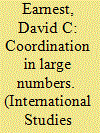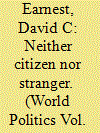| Srl | Item |
| 1 |
ID:
082468


|
|
|
|
|
| Publication |
2008.
|
| Summary/Abstract |
How do states solve n-choice cooperation problems? Although classical game theory offers useful insights into how states achieve cooperation, its focus on equilibria means that it is largely silent on the processes of negotiation, particularly when multiple solutions to a cooperation problem exist. To explore the path histories of international cooperation, this article uses an agent-based model to explore how states solve a coordination game with three equilibria. To further enrich the analysis, the model explores how domestic constraints may affect coordination games. Such state-level constraints may present negotiators with considerable informational costs and high barriers to understanding each other's preferences. The model finds that the process of communicating preferences can greatly affect the prospects for cooperation, independent of distributional consequences and concerns about cheating. It also finds that, contrary to collective goods theory, a large number of states coordinate a solution to the problem easier than small groups. This is because larger groups create denser networks that communicate preferences more efficiently. The agent-based model thus illustrates how simulation as a method can challenge our extant thinking about cooperation among nation-states. These findings have implications for research on interstate coordination, since it suggests transnational linkages may help states overcome information barriers that frustrate agreements
|
|
|
|
|
|
|
|
|
|
|
|
|
|
|
|
| 2 |
ID:
074558


|
|
|
|
|
| Publication |
2006.
|
| Summary/Abstract |
Why would democracies extend to aliens a right they historically have reserved for citizens-the right to vote? Some scholars argue that transnational movements and global norms increasingly moderate how states treat their aliens. If so, this is important evidence of a change in the meaning and content of sovereignty. This article investigates whether democratic states enfranchise their aliens in response to international, transnational, or domestic factors. While the article finds little support for transnational or systemic arguments, it also finds that political parties and judiciaries affect opportunities for aliens in ways the existing scholarship fails to explain. These findings suggest that both comparative and IR scholarship need to revisit their explanations for contemporary citizenship politics in democracies.
|
|
|
|
|
|
|
|
|
|
|
|
|
|
|
|